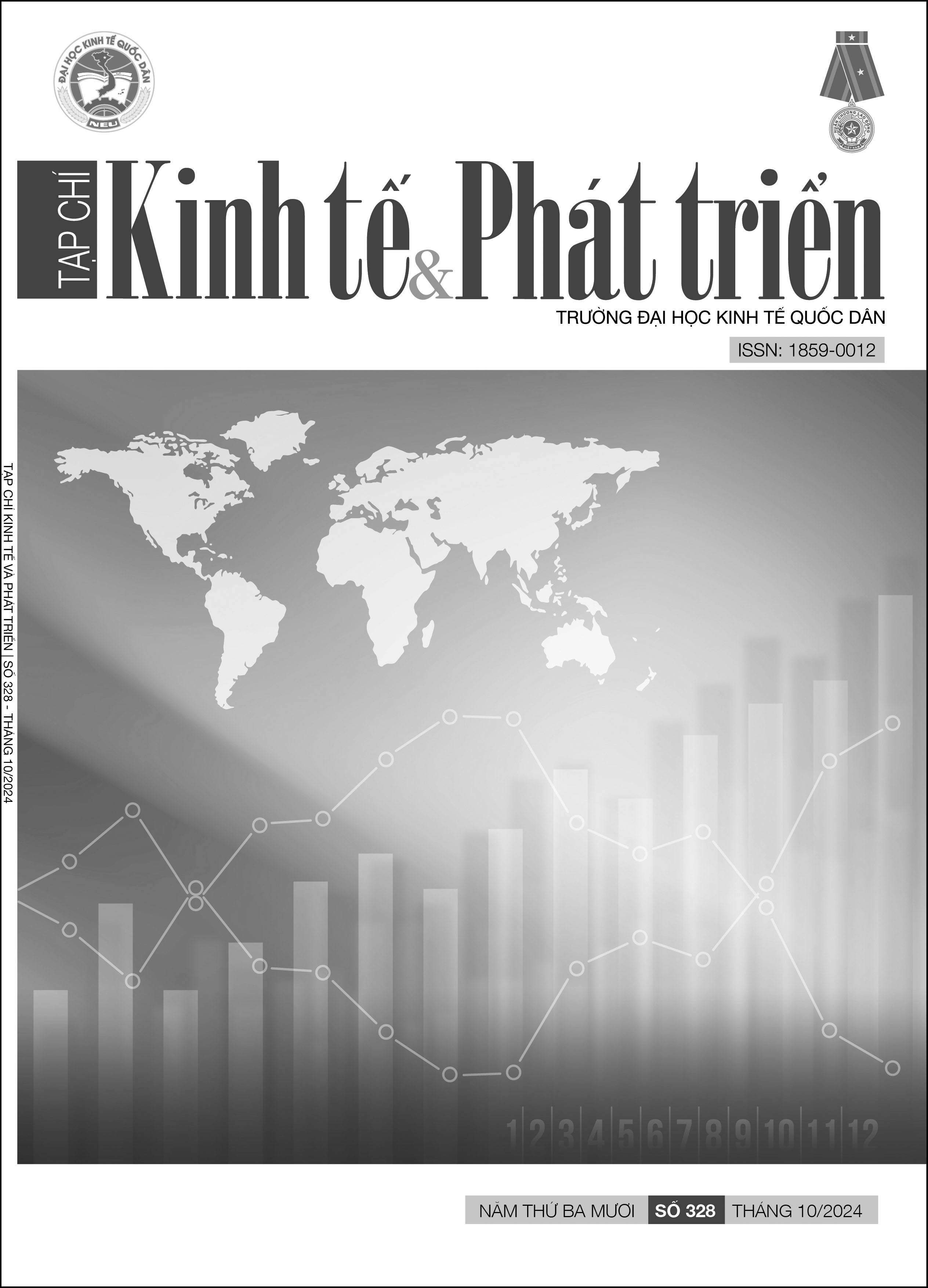Rủi ro chính sách thương mại của Mỹ và đầu tư hàng tồn kho của doanh nghiệp sản xuất Việt Nam
DOI:
https://doi.org/10.33301/JED.VI.1563Từ khóa:
rủi ro chính sách thương mại, hàng tồn kho, Việt NamTóm tắt
Sử dụng phương pháp bình phương tối thiểu thông thường với tác động cố định và cụm theo doanh nghiệp cho số liệu từ 269 doanh nghiệp sản xuất trên sàn chứng khoán Hà Nội và Thành phố Hồ Chí Minh giai đoạn 2011-2020, bài báo tìm thấy tác động của rủi ro chính sách thương mại Mỹ đến đầu tư hàng tồn kho. Kết quả nghiên cứu cho thấy: (1) rủi ro chính sách thương mại của Mỹ giúp thúc đẩy đầu tư hàng tồn kho và (2) tác động thông qua ba kênh (phụ thuộc tài chính bên ngoài, mức độ cạnh tranh, và khó khăn tài chính). Với kết quả trên, bài báo hàm ý rủi ro chính sách thương mại mở ra cơ hội cho các doanh nghiệp trong nước nếu Chính phủ chủ động hỗ trợ vốn để doanh nghiệp kịp thời khai thác các cơ hội đến từ rủi ro chính sách thương mại.
Tài liệu tham khảo
Alessandria, G. A., Khan, S. Y., & Khederlarian, A. (2022). Taking stock of trade policy uncertainty : Evidence from China’s pre-WTO accession (NBER Working Paper). https://doi.org/10.3386/w25965
Altman, E. I. (1968). Financial ratios, discriminant analysis and the prediction of corporate bankruptcy. The Journal of Finance, 23(4), 589–609. https://doi.org/10.1111/j.1540-6261.1974.tb00057.x
Amihud, Y. (2002). Illiquidity and stock returns: cross-section and time-series effects. Journal of Financial Markets, 5(1), 31–56. https://doi.org/https://doi.org/10.1016/S1386-4181(01)00024-6
Amihud, Y., & Levi, S. (2023). The effect of stock liquidity on the firm’s investment and production. Review of Financial Studies, 36(3), 1094–1147. https://doi.org/10.1093/rfs/hhac036
Baker, S. R., Bloom, N., Davis, S. J., & Kost, K. (2019). Policy news and stock market volatility (NBER Working Paper). https://doi.org/10.3386/w25720
Blundell, R., Bond, S., Devereux, M., & Schiantarelli, F. (1992). Investment and Tobin’s Q. Evidence from company panel data. Journal of Econometrics, 51(1–2), 233–257. https://doi.org/10.1016/0304-4076(92)90037-R
Bordo, M. D., Duca, J. V., & Koch, C. (2016). Economic policy uncertainty and the credit channel: Aggregate and bank level U.S. evidence over several decades. Journal of Financial Stability, 26, 90–106. https://doi.org/10.1016/j.jfs.2016.07.002
Caglayan, M., Maioli, S., & Mateut, S. (2012). Inventories, sales uncertainty, and financial strength. Journal of Banking and Finance, 36(9), 2512–2521. https://doi.org/10.1016/j.jbankfin.2012.05.006
Caldara, D., Iacoviello, M., Molligo, P., Prestipino, A., & Raffo, A. (2020). The economic effects of trade policy uncertainty. Journal of Monetary Economics, 109, 38–59. https://doi.org/10.1016/j.jmoneco.2019.11.002
Carpenter, R. E., Fazzari, S. M., & Petersen, B. C. (1998). Financing constraints and inventory investment: A comparative study with high-frequency panel data. Review of Economics and Statistics, 80(4), 513–519. https://doi.org/10.1162/003465398557799
Carpenter, R. E., Fazzari, S. M., Petersen, B. C., Kashyap, A. K., & Friedman, B. M. (1994). Inventory investment, internal-finance fluctuations, and the business cycle. Brookings Papers on Economic Activity, 1994(2), 75. https://doi.org/10.2307/2534655
Crowley, M., Meng, N., & Song, H. (2018). Tariff scares: Trade policy uncertainty and foreign market entry by Chinese firms. Journal of International Economics, 114, 96–115. https://doi.org/10.1016/j.jinteco.2018.05.003
Gulen, H., & Ion, M. (2016). Policy uncertainty and corporate investment. In Review of Financial Studies (Vol. 29, Issue 3, pp. 523–564). Oxford University Press. https://doi.org/10.1093/rfs/hhv050
Handley, K., & Limao, N. (2022). Trade policy uncertainty. Annual Review of Economics, 14, 363–395. https://doi.org/10.1146/annurev-economics-021622-020416
Handley, K., Limão, N., Ludema, R. D., & Yu, Z. (2020). Firm input choice under trade policy uncertainty (NBER Working Paper). https://doi.org/10.3386/w27910
Hsu, P. H., Tian, X., & Xu, Y. (2014). Financial development and innovation: Cross-country evidence. Journal of Financial Economics, 112(1), 116–135. https://doi.org/10.1016/j.jfineco.2013.12.002
Jones, C. S., & Tuzel, S. (2013). Inventory investment and the cost of capital. Journal of Financial Economics, 107(3), 557–579. https://doi.org/10.1016/j.jfineco.2012.09.001
Kaplan, S. N., & Zingales, L. (1997). Do investment-cash flow sensitivities provide useful measures of financing constraints? Quarterly Journal of Economics, 112(1), 169–213. https://doi.org/10.1162/003355397555163
Kim, K. (2020). Inventory, fixed capital, and the cross-section of corporate investment. Journal of Corporate Finance, 60(October 2019), 101528. https://doi.org/10.1016/j.jcorpfin.2019.101528
Li, M., Lin, Q., Lan, F., Zhan, Z., & He, Z. (2023). Trade policy uncertainty and financial investment: Evidence from Chinese energy firms. Energy Economics, 117(March 2022), 106424. https://doi.org/10.1016/j.eneco.2022.106424
Lyandres, E., & Palazzo, B. (2016). Cash holdings, competition, and innovation. Journal of Financial and Quantitative Analysis, 51(6), 1823–1861. https://doi.org/10.1017/S0022109016000697
Morikawa, M. (2016). What types of policy uncertainties matter for business? Pacific Economic Review, 21(5), 527–540. https://doi.org/10.1111/1468-0106.12196
Nagar, V., Schoenfeld, J., & Wellman, L. (2019). The effect of economic policy uncertainty on investor information asymmetry and management disclosures. Journal of Accounting and Economics, 67(1), 36–57. https://doi.org/10.1016/j.jacceco.2018.08.011
Phan, H. V., Nguyen, N. H., Nguyen, H. T., & Hegde, S. (2019). Policy uncertainty and firm cash holdings. Journal of Business Research, 95, 71–82. https://doi.org/10.1016/j.jbusres.2018.10.001
Pittman, J. A., & Fortin, S. (2004). Auditor choice and the cost of debt capital for newly public firms. Journal of Accounting and Economics, 37(1), 113–136. https://doi.org/10.1016/j.jacceco.2003.06.005
Rajan, R. G., & Zingales, L. (2001). Financial systems, industrial structure, and growth. Oxford Review of Economic Policy, 17(4), 467–482. https://doi.org/10.1093/oxrep/17.4.467
Wang, H., Shen, H., Tang, X., Wu, Z., & Ma, S. (2021). Trade policy uncertainty and firm risk taking. Economic Analysis and Policy, 70, 351–364. https://doi.org/10.1016/j.eap.2021.03.007
Wang, Y., Chen, C. R., & Huang, Y. S. (2014). Economic policy uncertainty and corporate investment: Evidence from China. Pacific Basin Finance Journal, 26, 227–243. https://doi.org/10.1016/j.pacfin.2013.12.008
Wu, J., Zhang, J., Zhang, S., & Zou, L. (2020). The economic policy uncertainty and firm investment in Australia. Applied Economics, 52(31), 3354–3378. https://doi.org/10.1080/00036846.2019.1710454
Xu, Z. (2020). Economic policy uncertainty, cost of capital, and corporate innovation. Journal of Banking and Finance, 111. https://doi.org/10.1016/j.jbankfin.2019.105698
Zeng, J., Zhong, T., & He, F. (2020). Economic policy uncertainty and corporate inventory holdings: Evidence from China. Accounting and Finance, 60(2), 1727–1757. https://doi.org/10.1111/acfi.12511
Zhao, X., & Chen, X. (2022). Inventory management with trade policy uncertainty. China and World Economy, 30(5), 128–153. https://doi.org/10.1111/cwe.12440





